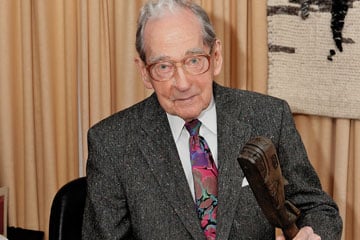Some lawyers never retire. That’s certainly the case for Mark Orkin, who has been dubbed the “God of Costs.”

Some lawyers never retire. That’s certainly the case for Mark Orkin, who has been dubbed the “God of Costs.”
Any lawyer who has ever had to research a cost question has likely read Orkin’s work on the subject, and he’s still going strong — well, as strong as a centenarian can.
Orkin turns 101 on Sept. 21 and he is Ontario’s oldest practising lawyer, according to Law Society of Ontario records. He’s entering his 70th year of practice, which likely makes him one of the oldest practising lawyers in the country, if not the world.
To put his life in some context, Orkin was born in 1917, when Robert Borden was prime minister, King George was the head of state and Canada was embroiled in the Conscription Crisis as part of the First World War.
He was called to the bar in 1948. Orkin worked for a few years under various lawyers before opening his own office in 1951. His rent was $35 per month, he recalls. When he closed his office in the Eaton Centre two years ago, his monthly rent was $3,500.
“I wouldn’t want to be starting out today,” he quips.
Like most lawyers back then, Orkin says, “you did everything,” including real estate, which was starting to take off as sleepy Toronto expanded, and litigation, where he focused his efforts.
The Second World War had just ended and “everything was small,” he notes. Only a few thousand lawyers were licensed to practise law. “The biggest firms in Toronto had maybe five to six lawyers. Now they are in the hundreds.” There was little technology in law firms, so typists and carbon paper were the order of the day. “There was a lot of handwork and a lot of footwork.”
While he has now closed his office, Orkin is far from retired. He consults with lawyers and spends much of his working days on the looseleaf service that bears his name, The Law of Costs, Second Edition, one of the first looseleaf services introduced to lawyers.
Orkin was born in Winnipeg, but he grew up in Montreal and Ottawa, before settling in Toronto to start his law career.
Orkin draws his work ethic from his dad, who “tried his hand at everything. He was a businessman on a small scale.”
Orkin developed his expertise in costs through hard knocks. In 1949, he says, a client “stiffed me for a fee,” a $1,700 bill, which he said is “chump change” by today standards, but it “was a lot of money back then.” The client claimed that he never retained Orkin. So Orkin fought it and won, and the appeal court later upheld the lower court ruling. “Eventually, he paid me,” he says of the client. That began his odyssey writing about developments involving retainers and legal bills. His first edition of the Law of Costs was a hardcover before morphing into the looseleaf service. Since then, his “Bible” as he calls it, has grown from a “measly binder” to three “huge, fat binders.”
He calls the Solicitor’s Act, which governs things such as unauthorized practice and solicitor costs, an “abomination.”
“The courts have been trying to figure out how to deal with it, interpret it and get around it for years.”
Along the way, though, Orkin has had some memorable moments outside the world of costs. He’s been to the Supreme Court of Canada a couple of times. He also played a “very modest part” as a law student in Noble v. Alley, a historic case dealing with a restrictive covenant in a land deed that prevented the sale of a property to Jews or Blacks. “It was a horrible covenant,” he says. He was involved in a motion to declare the covenant invalid, which was dismissed, a ruling later upheld by the Ontario Court of Appeal. The Supreme Court of Canada would later strike down the covenant in the 1950 ruling of Noble et al. v. Alley, [1951] SCR 64.
Orkin also had a role in persuading the courts to strike down the ban on contingency fees, helping lay the case law foundation for the eventual ruling in McIntyre Estate v. Ontario (Attorney General), 53 OR (3d) 137 (ON SC).
He has seen a lot in seven decades of practice. A main one is the growing complexity of the law. “We used to do everything that came in the door. You can’t do that anymore, it’s too complicated.”
However, one thing hasn’t changed much, he says, and that’s automation in the courts. “There is an apparent refusal or inability to make use of modern technology. You might as well be back in 1945,” he says, and he would know. Although, back then, he notes, the courts were open on Saturday until 1 p.m., unlike today.
There’s one thing he’s learned in his long life that he passes along. “There is no substitute for hard work. How you pay the rent — there is no romance or glamour to it. It’s just work.” Success as a lawyer, he says, lies in “keeping your costs down and your income up. It’s hard to do.” And it’s harder to do over 70 years. Just ask the God of Costs











